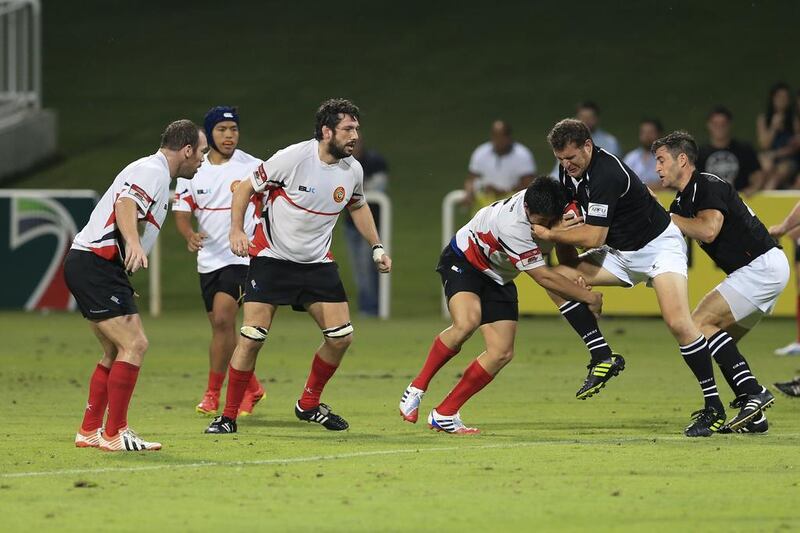DUBAI // Picking over the remains of another failed UAE rugby campaign to look for morsels of optimism has become an increasingly vexing exercise.
We are supposed to take the positives from a ninth straight defeat in Tests for a side who will have been winless for almost three years by the next time they congregate.
Please, spare us. Unless they are going to act on the good things that happened in Wednesday's loss to Singapore, and reinforce them, then the positives are redundant.
If we are going to be talking about a “new-look side” being “plucky in defeat” this time next year, then they might as well pull the ladder up on the whole operation.
International representative rugby has never been at a lower ebb in this country.
The national team will play in the third rung of Asian competition next year, in the same division as Qatar. It has taken five years since the break up of the Arabian Gulf union for two of its constituent nations to reach the same level.
Had Qatar not been deprived promotion after winning their division two years ago, they could conceivably have leapfrogged the UAE by now.
The UAE were given the Arabian Gulf’s place in the top flight of Asian rugby when the multi-state union was disbanded at the end of 2010. Maybe they should not have been, having recorded two wins, a draw and 17 defeats since.
Yet it seemed a no-brainer at the time. The UAE, with a thriving club scene in Dubai and a rapid expansion in Abu Dhabi, is the place to be in rugby in the region.
It is home to the two standout clubs in Arabian Gulf rugby – Jebel Ali Dragons and Abu Dhabi Harlequins. Qatar and Bahrain only have one club each of note, so their player pool is much smaller.
The dwindling standards for the national team seem a puzzle then, although it is probably because of the vast disconnect between the domestic game and the national team.
[ Listen to Paul Radley’s podcast chat about the state of UAE rugby after their defeat to Singapore. ]
On Wednesday night, while the have-a-go heroes who had made themselves available to train for the national team were being beaten by a better prepared side, there were numerous worthy others who were absent.
In the lead up to their tour to Dubai, Singapore played a succession of warm-up matches against their domestic club sides, winning each.
Had the UAE dared do the same, no matter how light they were on match practice, it could have been extremely counter-productive to morale.
A warm up match against the treble-winning Jebel Ali Dragons, for example, against Sean Crombie, Nick Taylor, Murray Strang, Imad Reyal, et al, would have resulted in a thrashing for the national team.
For far too long this has been a wasteland for eligible, highly talented players who are not empowered by the national team and it must be rectified
Even raising the debate feels like Groundhog Day. It even predates the advent of UAE rugby, as the Arabian Gulf had the same problem at times – although not to the extent of now.
Given the seemingly constant flux within the game’s administration here, the players should take it upon themselves to sort the problem, like in the good old days.
Adam Telford was outstanding as the all-action captain of the UAE team against Singapore and he is also one of the few players in that side who has had a discernible impact on top flight rugby in this country this season.
Maybe he could coerce a few of the eligible players from his market-leading Dragons side to make themselves available – and known – to the national team selectors.
Roelof Kotze, the new performance manager of the game here, would be delighted to have them to choose from.
He was upbeat enough about the future after the loss to Singapore. He said the chance to rebuild in the more forgiving environment of the third tier – ideally with a few more players to select from – is something to look forward to before he added tongue-in-cheek: “If I’m here for a whole year.”
It was not obvious whether he meant the sword of Damocles dangles over any coach in the role he has – he is the third performance manager since this time last year – or whether he would want to stick around.
Given the work he has done previously in his native South Africa, the UAE are lucky to have some of his experience driving the transition of the game to increased Emirati participation.
He is firm on the fact players should never be over-promoted, no matter what the target is. Hopefully he has the courage to stick to his convictions.
If he is not able to, maybe a return home would be the more rewarding option for him, anyway.
pradley@thenational.ae
Follow us on Twitter @SprtNationalUAE






